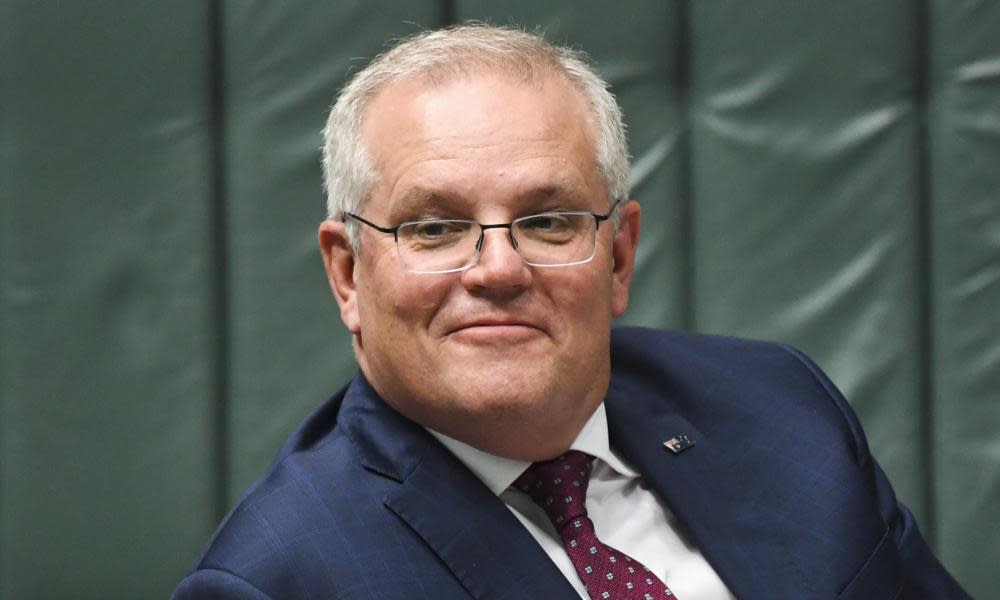Labor says scandals are behind federal Icac delay as Coalition blames Covid

Scott Morrison claims the sustained pressure of managing the coronavirus pandemic has prevented the government from landing its longstanding commitment to establish a national anti-corruption body.
With controversy over the Leppington triangle land purchase continuing to reverberate, and questions being raised over contact between the deputy prime minister Michael McCormack and the disgraced New South Wales MP Daryl Maguire, Labor on Wednesday confronted the government over its persistent failure to establish a federal anti-corruption body.
Work on the Coalition’s proposal began in 2018, and officials from the attorney general’s department have confirmed the attorney general, Christian Porter, received a draft bill to establish the body in December 2019 – a fact first revealed by Guardian Australia in January.
Morrison on Wednesday declared the government’s anti-corruption watchdog proposal required complex consultation, and he did not want “one public servant diverted” from managing the public health crisis.
Related: Western Sydney airport: families left in 'indefinite limbo' call for end to backroom deals
But Labor used question time to challenge those claims. The opposition linked the slow progress to recent scandals involving overpayment for land at Western Sydney airport and an alleged cash-for-visa scheme run by former NSW MP Daryl Maguire.
The government reiterated its commitment to establish the anti-corruption body, but Porter defended the delay by telling the lower house it was a matter of “common sense” not to conduct consultation “during the height of a global pandemic”.
Labor also prosecuted the issue through Senate estimates committees, discovering the government had conducted other consultations during the pandemic including on a bill to create a veterans’ suicide commissioner. The opposition also noted that the Coalition had established a Higher Education Integrity Unit in June.
Some 93 bills have passed parliament in 2020. Many major policy initiatives have not been Covid-related including bills on environmental approvals, banning refugees’ and asylum seekers’ access to mobile phones in detention, clarifying political donations laws and vetoing deals with foreign governments.
The shadow attorney general, Mark Dreyfus, said it was clear the “Morrison government has no interest in integrity or fighting corruption and is using the Covid crisis as an excuse”.
He labelled the commitment “a sham” because the preferred model of expanding the Australian Commission for Law Enforcement Integrity’s jurisdiction is “so weak, ineffective and opaque it was unable to instigate independent inquiries, to hold public hearings, or even investigate any of the multiple past scandals of the Morrison government”.
On Wednesday the attorney general’s department revealed that an allocation of 76 staff for the integrity commission contained in the 2020 budget was an error. The government has promised to release a draft of the bill soon, but ministers have refused to nominate a deadline.
An anti-corruption body has been a rallying point for crossbench MPs and senators throughout the last two terms of parliament.
But demands for a result have grown after high-profile scandals including the politicisation of $100m of sports grants, the purchase of land worth $3m for $30m in the Leppington triangle, and revelations about Maguire’s relationship with NSW premier Gladys Berejiklian in that state’s Independent Commission Against Corruption.
On Tuesday Morrison distanced himself from the latter scandal by stating that preliminary searches had not located any correspondence from Maguire during his time as immigration minister or prime minister.
On Wednesday the home affairs department revealed that after a further search it had found one piece of correspondence from Maguire to Morrison in 2014 “in his role as a local member on behalf of a constituent, advocating for the deportation of a convicted child murderer”.
“The then minister [Morrison] responded factually to outline the process his department was already taking to review the matter,” the prime minister’s office said in a statement.
In question time, the deputy prime minister Michael McCormack confirmed he had discussed road projects with Maguire, explaining that their federal and state electorates overlap, but denied discussing “other land acquisitions”.
Labor also asked why the head of the bushfire recovery agency, Andrew Colvin, told Senate estimates on Tuesday he had never heard of Peter Crone, an associate of John Howard, who had been engaged as a contractor at the agency.
In reply, Morrison refuted the claim Crone was paid $240,000, insisting the true figure is $136,000 for work that ran from January to June.
Morrison rattled off Crone’s credentials as an economist but did not answer why Colvin had never heard of a contractor engaged at his agency. “If you are good at your job, you will get a job, that’s how it works,” he said.
Labor is still pursuing the $30m Leppington triangle purchase, after revelations this week the auditor general had referred the matter to the Australian federal police because he feared the commonwealth may have been defrauded.
The finance secretary, Rosemary Huxtable, defended her department’s role in the sale, explaining that the infrastructure department was the decision-maker while finance merely “operationalised the decision” by providing final sign-off.
Huxtable said although the finance department was aware of the $30m sale figure, it was not aware of the detail and had not been consulted on the valuation strategy.
Labor’s Katy Gallagher characterised finance’s limited role of checking technical processes as providing “a rubber stamp for a dodgy deal”.
The finance minister, Mathias Cormann, conceded the purchase was “clearly highly unsatisfactory” but pointed the blame at the infrastructure department.
The auditor general had been “through this with a fine-tooth comb … [and] did not direct any findings or recommendations at finance”, he said.

 Yahoo News
Yahoo News 
